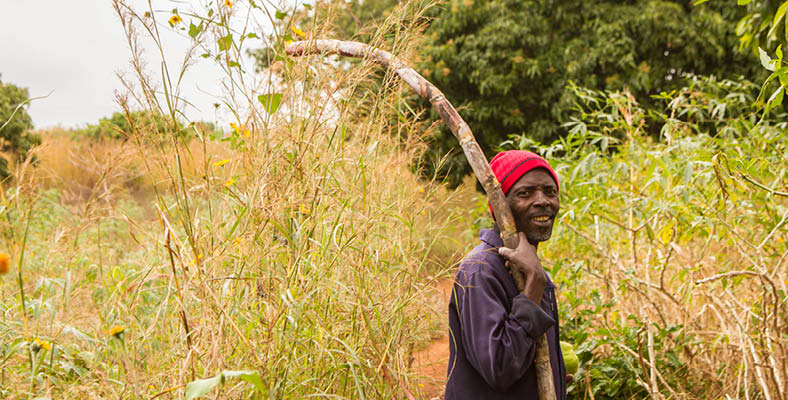
We are in the midst of the third major food crisis in 15 years. This is no accident. It is the result of an unjust global food system that prioritises profits over peoples’ rights, lives and the environment. Worldwide hunger, malnutrition and rising food prices are a result of an unsustainable economic system. The answer can only be system change, towards a food system based on agroecology and food sovereignty.
The invasion of Ukraine by Russia brought the food crisis to the headlines, with prices of wheat shooting up 70%. The FAO predicted a possible additional 13 million people pushed into hunger. Yet, prices were rising even before any supply gaps, pushed up by food trader speculation and profiteering in financial markets. The panic in global food markets, caused by the conflict between the world’s largest producers of wheat and chemical fertiliser, has exposed the huge fragility of a global food system. Today, at least 20 countries depend on Russia and Ukraine for half of their wheat imports. In Eastern Africa, wheat has become a staple food, despite not being grown in the region. 84% is imported, mainly from Russia and Ukraine.
A fragile food system built on neoliberal doctrineThe current industrial food system is a driver of multiple crises: climate, food, environmental and public health crises. Global production chains are also highly vulnerable to these shocks. Supplied by an industrial model of food production, they rely heavily on fossil fuels and chemical inputs, and are dominated by a handful of corporations. This means that food prices track rising energy prices, while intensive food production contributes to carbon emissions and environmental destruction.
As the climate crisis intensifies, extreme weather events like the droughts, floods and heatwaves experienced in the Horn of Africa, Pakistan and Europe this year become more frequent. This pushes vulnerable people further in to poverty and hunger, whilst affecting small-scale producers’ ability to feed their communities in the future. Ongoing conflicts, wars and occupations are among the main drivers of global hunger. Often these conflicts are over resource extraction or land, which are made worse by climate change.
Moreover, years of neoliberal doctrine and policies (structural adjustment, conditional loans, financial sector deregulation and free trade agreements) has pushed many previously food self sufficient countries into dependency on imports. Escalating conditional debt for countries in the Global South, like Sri Lanka, has stripped them of the ability to provide public funding to cope with rising food prices, health costs, energy poverty or climate impacts.
Hunger and food crisis are a structural shameHunger was widespread even before the Russia-Ukraine conflict began. According to the FAO, between 702 and 828 million people were affected by hunger in 2021. In 2020, over 2 billion did not have adequate access to food. The Covid-19 pandemic pushed 150 million more into hunger.
These persistent and shocking levels of hunger expose structural problems in the industrial food system. The issue is not inadequate food production, but a blind obsession with productivity, profits and global markets as the way to supply food, rather than a focus on realising the Right to Food, and peoples’ rights more widely.
Agribusiness controls the marketWorld over, we are seeing structural poverty, low wages and sharpening inequality. The agribusiness industry is dominated by a handful of companies, with enormous influence over markets, research and policy. The “big four” grain traders – Archer Daniels Midland, Bunge, Cargill and Louis Dreyfus – reported their highest ever profits in 2021. The overall wealth of food corporations and billionaires grew by 45% in 2021/22, to $382 billion. Transnational corporations have turned food into a financial commodity, with which they speculate and enrich themselves without measure.
Meanwhile, small-scale producers face increasing repression and threats to their livelihoods. Agribusinesses are using the food crisis to lobby for more subsidies and rip up existing regulations. Under the cover of ‘crisis response’, they can grab land and resources from peasants, indigenous peoples and family farmers, for monoculture tree plantations or intensive farms, for example. Yet, this ‘Peasant Food Web’ provides the food for more than 70% of the world’s people. They produce in a more sustainable manner, using less than 25% of the world’s resources (land, water, fuels).
Our call for system change towards food sovereigntyThe answer to the global food crisis is not to deepen free markets, or to produce more intensively. We need a shift in focus, away from profits and economic growth, towards the Right to Food.
People around the world are already working towards this transformation – from urban gardens in Malaysia to native seed networks in Uruguay. In places like Togo, El Salvador, and the Philippines, local agroecological food systems and short supply chains proved resilient and innovative during the COVID 19 pandemic. A radical transformation of our food system towards food sovereignty is possible. It requires adequate public policies to reduce dependency on food imports and boost domestic food systems, especially in the Global South. This means ensuring social and economic justice, via debt cancellation, stopping free trade agreements and unfair investment deals. It means dismantling corporate power.
It also requires investment in public institutions and policies to support the Right to Food and agroecology, whilst guaranteeing peoples’ rights to control their territories – land, water and seeds. This means valuing local knowledge and markets, and nurturing social relations founded on justice and solidarity. It involves tackling the overlapping oppressions that operate in the food system – patriarchy, racism, colonialism and class – and recognising the fundamental role of women in food production. Ultimately, it means supporting those who feed the world in a way that protects biodiversity, lowers emissions and counters destructive industrial agriculture.
The answer to the global food crisis is system change.
“This article appeared on Friends of the Earth International’s website and has been published here with permission.” Photo: “A farmer in Mozambique. Photo by Amelia Collins, Friends of the Earth International”.